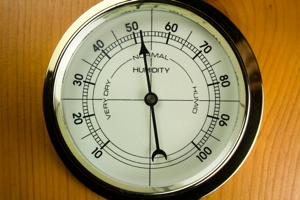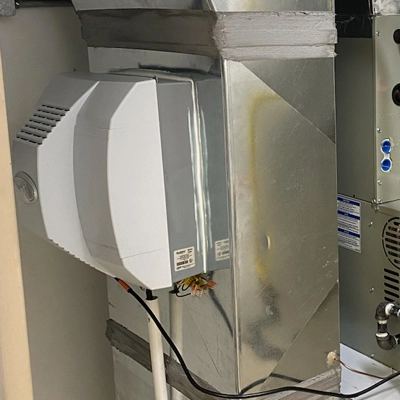While I don’t recommend many accessories for an HVAC system, a whole house humidifier is always one of them.
Humidifiers are essential to keep a home comfortable and improve indoor air quality. Without one the air in your home can be as dry as grandma’s potato salad.
So what’s the best humidifier for your home? That will depend on a few factors. Let’s start with discussing your options and the most popular whole house humidifier types.
What Are The 3 Most Popular Whole House Humidifier Types?
The most popular whole house humidifiers are the Evaporative Bypass, Evaporative Power and Steam. Each of them have their own advantages and disadvantages. And it’s not uncommon for some companies to downplay the disadvantages of the more expensive humidifiers just to pad their bottom line.
So let’s talk about the pros and cons of each humidifier type so that you can make an informed decision when purchasing one for your home.
What Is An Evaporative Humidifier?
Let’s start by explaining what we mean when we say evaporative humidifier.
Evaporative humidifiers are a type of whole house humidifier that uses evaporation to add humidity to the air. Well, duh. You can figure that out from the title. But what does that mean?
Evaporation is the process of a liquid changing into a gas or vapor. It occurs when molecules in a liquid gain enough energy to escape from the surface of the liquid and become a gas. This energy can come from heat, sunlight, or other sources.
In the case of humidifiers, evaporation happens when a liquid is exposed to dry air. This causes some of its molecules to break away and become airborne thereby adding water vapor and humidity to the airstream.
Whole House Bypass Evaporative Humidifiers
On a bypass humidifier, air is directed over a replaceable panel that has a small amount of water gently running through it. As the air passes through the panel, water evaporates into the air, is circulated through the ductwork system and increases the humidity level in the home.
What makes bypass humidifiers unique (and where it gets its name) is how the air passes over the water panel.
The airflow needed for a bypass humidifier is supplied by a bypass duct from the opposite side the ductwork the humidifier is mounted on. So if the humidifier is mounted on the return (intake) side of your ductwork system, a bypass duct would be taken off the supply (output) side of your ductwork.
This bypass will cause a natural flow over the water panel without the need for any other motors or devices to drive airflow. As long as the system is moving air then the humidifier will add the needed humidity.
Bypass humidifiers are the most popular type of whole house humidifier. And for good reason.
Bypass Evaporative Humidifier Advantages
1) Cost – The Bypass Evaporative Humidifier is the least expensive humidifier to install, maintain and repair. Average price for a new installation of a bypass humidifier will cost around $500-$900
2) Maintenance – All humidifiers require maintenance. But the bypass is hands down the easiest to maintain. Usually just once a year a small amount of cleaning and an inexpensive water panel the humidifier can keep your home’s humidity perfect.
3) Reliability – With so few moving parts the bypass humidifier has very little that could break. Because of this these units tend to be very reliable as long as they’re maintained. And if they do need a repair the parts are easily available and relatively inexpensive.
4) Longevity – Because there’s not much to these humidifiers, they tend to last many years. In my experience, 20 years is not uncommon.
Bypass Evaporative Humidifier Disadvantages
1) Seasonal Changes – A bypass humidifier has a damper that needs to be opened in the winter and closed in the summer. It’s easy to do but if you’re the kind of person that NEVER wants to be bothered by any kind of maintenance…forget the bypass humidifier. And rethink owning a house while you’re at it.
Whole House Power Evaporative Humidifiers
A power evaporative humidifier operates in the same way as a bypass humidifier. A small amount of water gently runs through it. As air passes over the water panel, water evaporates into the air adding humidity to the home.
The one difference is how the air is passed over the water panel. Rather than use a bypass duct, a power humidifier uses a small motor within the humidifier itself to generate the airflow needed to flow over the water panel.
Expect to pay about $800-$1200 for a new installation of a power humidifier.
Power Evaporative Humidifier Advantages
1) Size – While the humidifier itself is slightly larger than a bypass, because there’s no need for the bypass ductwork, the power humidifier can fit in some applications where a bypass cannot.
2) Maintenance – Like the bypass, the power humidifier is easy to maintain. A once a year tune up on it with some cleaning and a new water panel and the humidifier will stay running smoothly.
3) Seasonal Changes – Because there’s no bypass ductwork there’s no need for a damper that needs to be changed between the winter and summer seasons. If the humidifier is located in an inconvenient spot or you just don’t want to be bothered with another to do item, the power humidifier might be right for your home.
Power Evaporative Humidifier Disadvantages
1) Reliability – With more parts comes more possibility for repair issues. Power humidifiers aren’t necessarily repair prone but when compared to a bypass they do tend to break down more often.
2) Longevity – In addition to being more complicated and in need of repairs comes the problem with longevity. Due to repair costs it doesn’t take long before it makes more sense to replace the humidifier rather than repair it. Most power humidifiers will only last 10-15 years.
Whole House Steam Humidifiers
Steam Humidifiers deliver humidity in the form of steam directly into the ductwork and then into the home. If your home doesn’t have ductwork, a steam system also has the ability to add a fan system to it so it can work independently.
A steam humidifier generates steam by energizing electrodes that are within a special canister of water. Current flowing between the electrodes causes the water to boil, creating steam.
These units are pushed by some contractors. But not good ones. Since it’s the most expensive type of humidifier and most repair prone they tend to be used to pad the bottom line of shady contractors.
Now let me be very clear…I don’t hate steam humidifiers. AND I do believe they are the best fit for some applications. BUT, unless you have a unique application or live in a desert region, there’s no reason to install a steam humidifier.
Steam Humidifier Advantages
1) Applications – Because of their high capacity, these units are your first choice if you live in a desert climate like Arizona, New Mexico, Southern Nevada or Southern California.
Steam Humidifier Disadvantages
1) Cost – The Steam Humidifier is the most expensive humidifier to install, operate, maintain and repair. Average price for a new installation of a steam humidifier will cost around $2000-$3000
2) Maintenance – Steam humidifiers need to be maintained at least once a year and sometimes more. It’s not uncommon for the canister to only last one or two years. Each time it needs to be replaced it will run at least $200-$400.
3) Reliability – Because of the complicated nature of these systems, steam humidifiers are repair prone. They also tend to have problems because of water quality. In addition, the repairs tend to be very expensive.
4) Longevity – Just like a power humidifier, being more complicated and repair prone brings with it the problem of longevity. It often makes more sense to replace the humidifier rather than repair it. Don’t expect more than 7-10 years out of a steam humidifier.
How Do I Choose The Best Type Of Whole House Humidifier For My Home?
When it comes to choosing the right whole house humidifier for your home, there are just a few factors to consider.
- Size of your home
- Climate you live in
- Style of HVAC system
As far as brands, Aprilaire, Honeywell and General are the biggest brands but don’t let that influence your choice. Ultimately, a good quality contractor will help you pick the best type of humidifier for your home. Find a good contractor and they’ll use their expertise to help you choose.



